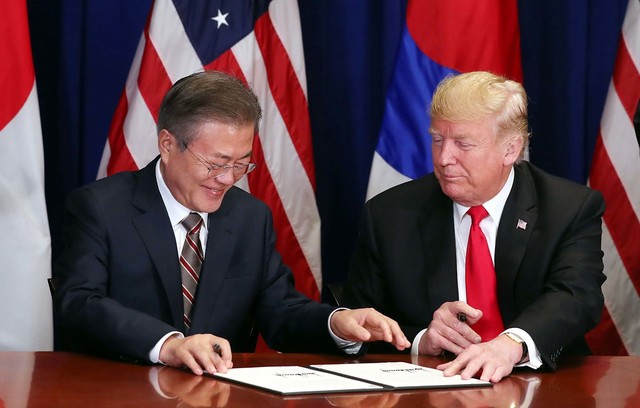 |
|
South Korean President Moon Jae-in and US President Donald Trump sign a revised FTA treaty following their summit at the Lotte New York Palace hotel in Manhattan on Sept. 24, 2018. (Blue House photo pool)
|
Navigating the tricky relationships involving the US, China, and Japan
Two years have passed since Moon Jae-in became president of South Korea, and so much has happened in that short time. When Moon’s administration began, the most urgent issue was relations with North Korea. One way or another, the government sought to preclude the possibility of a military conflict or war on the Korean Peninsula, with tensions at their peak. The Moon administration worked toward North Korea’s denuclearization on a basis of dialogue and diplomacy, with both South and North Korea pursuing a path toward unification through coexistence, prosperity, and peace. In order to guarantee the campaign for peace, the government also pushed through defense reform, moving toward recovering South Korea’s wartime operational control of its own troops while also seeking to acquire the defensive capabilities needed to counter the North’s weapons of mass destruction. While this hasn’t received much attention yet, the agreement reached by South Korea and the US early in the Moon administration to lift the restrictions on the weight of missile warheads is extremely significant for augmenting the country’s defense capability. With South Korea’s diplomatic prestige in grave jeopardy, the next challenge was to become more assertive in diplomacy with the four powers around the Korean Peninsula through the principle of strength at home. South Korea was at odds with China because of the previous (Park Geun-hye) administration’s decision to deploy the THAAD missile defense system, and there was sharp domestic pushback to the comfort women agreement that the Park administration had unilaterally reached with Japan. The Moon administration sought to create a new space for diplomacy through the “Northeast Asia Plus Community of Responsibility,” which was later subdivided into the “New North Policy” and the “New South Policy.” The government established the goal of building amiable and cooperative relations based on trust with the four powers. Over the past two years, Moon has persuaded US President Donald Trump, who has espoused US protectionism, to agree that denuclearization talks with North Korea are more in line with the US national interest than military means. That brought in an era of dialogue and negotiations on the Korean Peninsula in 2018 and result in a marked decrease in the threat of war. The Moon administration can be seen as having put up a good defense to wide-ranging pressure on trade from Trump. South Korea also reached a consensus with China that allowing bilateral relations to deteriorate over THAAD was not in their national interests. The pursuit of the New South Policy has brought India and Southeast Asia closer to the scope of South Korean foreign policy, which is another major achievement. The challenges to the Moon administration’s foreign policy and security policy are growing more intense. First is the appearance of a new variable: the strategic competition between the US and China. That competition puts South Korea under pressure to make a tough choice, which could lead to a dramatic deterioration in relations with China. China no longer needs South Korea’s help to run its economy, giving it more room to pressure South Korea, both politically and economically. If Trump attempts to counter China in ways that go beyond THAAD, such as by deploying intermediate-range ballistic missiles to the Korean Peninsula, the consequences would be unimaginable. South Korea is extremely vulnerable to such pressure. Second, South Korea’s worsening relations with Japan are extremely worrisome. The Moon administration’s original goal was to establish “a mature, future-oriented cooperative partnership.” But relations between the two countries have been severely damaged by a lack of mutual trust, Japan’s own domestic issues, and a Supreme Court ruling prioritizing principles and justice regarding Korean victims of forced labor during the Japanese colonial occupation. A friendly and cooperative relationship with Japan is essential for dealing with the ROK-US alliance, the North Korean nuclear issue, trade, and the China-US strategic competition. But we still haven’t managed to find a solution. N. Korea’s denuclearization no longer a top priority for US and China Third, the North Korean nuclear issue is evolving into an issue that goes beyond inter-Korean relations and that must be dealt with in the context of the US-China strategic competition. The North Korean nuclear issue is no longer a top policy priority for China or the US, a consideration that will also likely prompt North Korea to delay denuclearization. This tells us that we’ve reached the point where the Moon administration must develop a new approach to dealing with the North Korean nuclear issue. The Moon administration can also be criticized for being so focused on the North Korean nuclear issue that it has neglected foreign policy with the four powers.
 |
|
Kim Heung-kyu, professor at Ajou University
|







